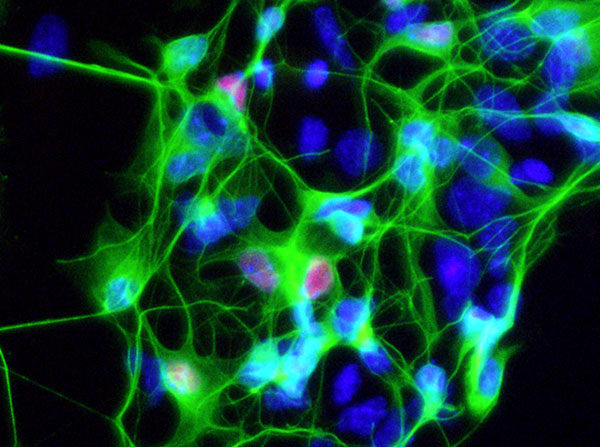
Motor neurons derived from an ALS patient (Image courtesy of the Ichida Lab)
The teams are the winners of the Audrey E. Streedain Regenerative Medicine Initiative Awards, supported by a generous bequest by the Audrey E. Streedain Trust to the Department of Stem Cell Biology and Regenerative Medicine at the Keck School of Medicine of USC. Totaling $140,000 each, the awards support USC-affiliated faculty members pursuing multi-investigator research collaborations with the goal of curing diseases using stem cells as tools.
One winning proposal combines the complementary expertise of researchers Justin Ichida and Paula Cannon, two faculty members with appointments in the department of stem cell biology and regenerative medicine. The team aims to develop a technique for correcting a gene mutation responsible for 10 percent of all cases of frontotemporal dementia (FTD) and amyotrophic lateral sclerosis (ALS), two fatal diseases in which nerve cells degenerate.
A leading expert in reprogramming stem cells into neurons, Ichida has already demonstrated that correcting or “editing” mutations in a gene called C9ORF72 can rescue neurons in a petri dish. In order to move beyond the petri dish, he will team up with Cannon, who develops cutting-edge techniques for delivering gene editing technology to cells in living organisms. In this case, Cannon and Ichida will deliver their gene editing technology by putting it inside of an adeno-associated virus (AAV), which can naturally enter cells.
They hope that these experiments will demonstrate the effectiveness of their approach in mice, and lay the foundation for a clinical trial to treat patients with these devastating neurodegenerative diseases.
“These grants are pretty unique in that they allow the type of high-risk research that isn’t feasible without collaboration,” said Cannon, who also has appointments in the departments of molecular microbiology and immunology, pediatrics, biochemistry and molecular biology. “And our students and fellows are on board, excited by the opportunity to be exposed to the different technologies that each lab has expertise in.”
The other winning proposal brings together basic scientist Jian Xu and cardiac surgeon-scientist Ram Kumar Subramanyan in an effort to find new strategies for healing damaged hearts.
Damage occurs when clogged arteries block blood flow to the heart, starving it of oxygen, and injuring and scarring its muscle. This can eventually lead to heart failure.
In an attempt to reverse this process, the researchers are studying a gene called p53, which sends signals to cells known as fibroblasts, instructing them to transform themselves into cells that line new blood vessels, thereby promoting the growth of new arteries. This improves blood flow to injured hearts, which can in turn improve healing.
“One in every 14 Americans suffers from coronary artery disease, resulting in an average of one death every 38 seconds,” said Subramanyan. “There is no effective durable therapy to halt or reverse progression of coronary artery obstruction. The direct and indirect cost of managing heart disease is estimated to be over $500 billion. This proposal attempts to instruct the damaged heart to form its own native new functional blood vessels and has the potential to be the only lasting solution to this vexing problem.”
Xu added: “This work will generate crucial information on cardiac neovascularization during injury repair. We are grateful to the Audrey E. Streedain Trust for its commitment to promoting research on tissue repair and regeneration, and helping patients with cardiovascular diseases.”
As Andy McMahon, chair of the executive committee of USC Stem Cell, explained, “These collaborative projects share an ambitious goal: to move basic research into the clinic. By enabling scientists and clinicians from across USC to work together, these awards lay the groundwork for the regenerative therapies of tomorrow.”
by Cristy Lytal